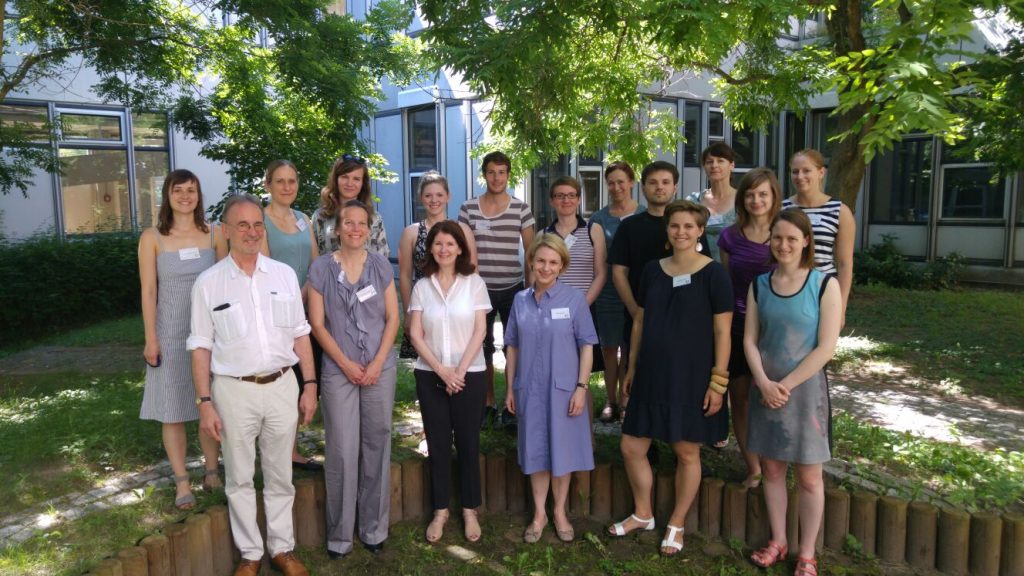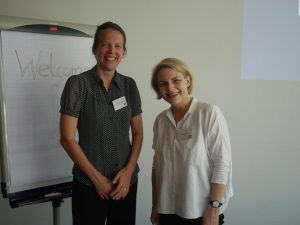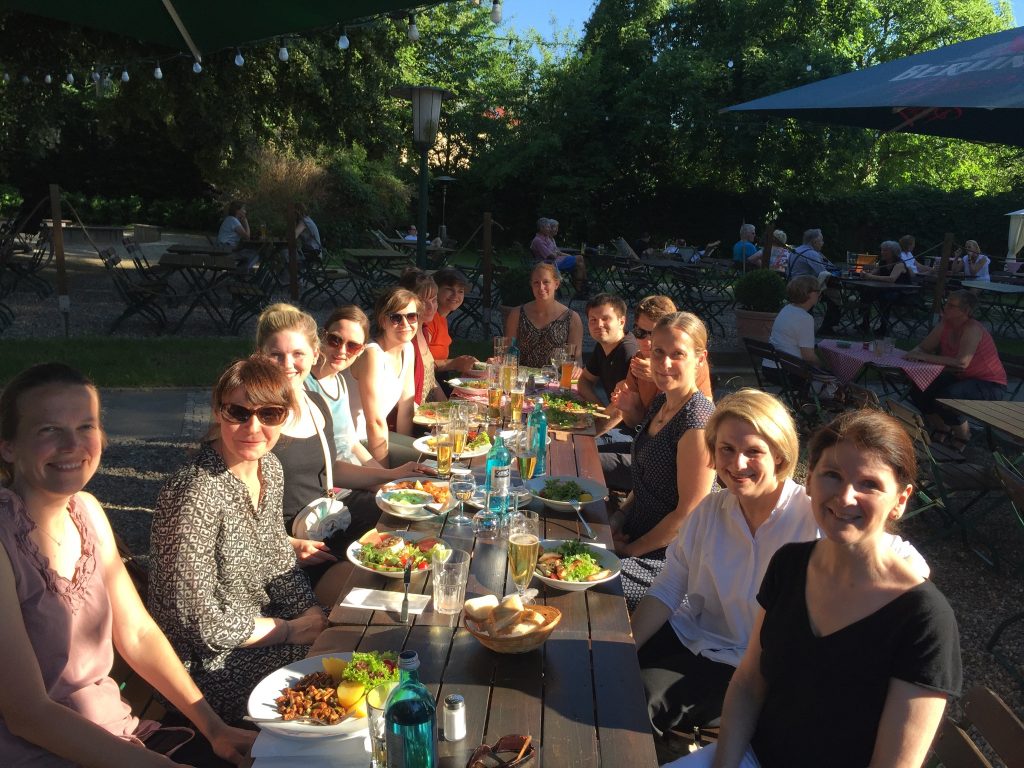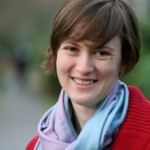By Ellen Stephenson

The Berlin Workshop Group
Faculty and students from the psychology department’s health area recently travelled to Berlin to establish new ties with several research teams there. At the core of the visit was a two-day workshop to explore the importance of social relationships for health outcomes across the adult lifespan.
Hosted at the Free University of Berlin, the workshop was designed to foster training opportunities for graduate students and generate a platform for the development of new collaborative research projects among faculty. It combined project presentations with plenary discussions and individual consultation opportunities, a format that was found to be ideal for generating future ideas and collaborations.

Drs. Christiane Hoppmann and Nina Knoll (l-r)
On the first day, each student was given the opportunity to present his or her work. Each presentation was followed by a question and answer period, which often lead to a lively group discussion. The second day consisted of roundtables related to central themes in Health psychology and the workshop theme of social relationships and health across the adult lifespan. Finally there was time set aside for individual meetings to plan collaborative research projects and potential graduate student exchanges.
This workshop, the first of its kind, has lead to several collaborations, including plans for a Quinn Graduate Students exchange between UBC and FUB. It was made possible through joint funding from UBC (Linkage grant and area funds) and the Free University of Berlin.
This workshop definitely exceeded my expectations. I had hoped to form connections with one or two of the students and faculty from Berlin. Instead, I came away having had the opportunity engage in discussion with all of the workshop participants and feeling as though I had formed important professional relationships with each of them.
In addition to the workshop we also managed to do some site seeing while we were there, including visits to the Berlin Wall Memorial, the Brandenburg gate, Check Point Charlie museum. Given the hot, sunny weather, we also made sure to take advantage of the outdoor beer gardens.

The group enjoying the beer gardens
Some of the faculty and graduate students who participated in the events and activities share their thoughts and experiences on the workshop:
Dr. Christiane Hoppmann, Associate Professor, Psychology Department, UBC
“The FUB-UBC linkage grant played a pivotal role in building new partnerships by creating a platform for the exchange of ideas that are likely going to lead to new collaborations among faculty while at the same time providing the next generation of health psychology scholars with excellent networking opportunities. The conversations kicked of several follow up projects that are already in the planning stages.”
Dr. Nina Knoll, Professor, Department of Education and Psychology of the Free University of Berlin
“I very much benefitted from our UBC-FUB linkage workshop experience. Rich exchange with PhD students and UBC faculty was a great inspiration. I am looking forward to continued collaboration via PhD-student/postdoc exchanges and cooperation in future projects.”
Dr. Michaela Riediger, Heisenberg Fellow of the German Research Foundation, Department of Education and Psychology of the Free University of Berlin and Max Planck Institute for Human Development, Berlin
“I very much enjoyed the FU – UBC workshop in Berlin. It was very inspiring to learn about the research projects that were presented, and I am deeply impressed by the quality of the young researcher’s work. I had inspiring conversations about potential future collaborations with several people and am very much looking forward to continuing these in the future. In a nutshell: my expectations for this workshop were more than fulfilled, and I am grateful that I was part of it. Many thanks to Christiane, Nina, Anita and everyone else for making this possible.”
Dr. Antje Rauers, Research Associate, Department of Education and Psychology of the Free University of Berlin
“This was a great workshop all around. It combined project presentations with plenary discussions and individual consultation opportunities, a format which I found ideal for generating future ideas and collaborations. The group constellation was also ideal for this purpose: People’s overlap regarding their research interests and the employed methods was sufficient to allow for sophisticated discussions, but there was still enough diversity among us to provide each other with new perspectives and impulses for future research.”
Victoria Michalowski, PhD student, UBC
“The workshop was a valuable and appreciated addition to my training as a graduate student in Health Psychology. It is a rare opportunity to have one-on-one, in-depth contact with an international group of researchers who study social relationships for health outcomes across the lifespan. Such a context made it easy and natural to make connections with other junior as well as senior level researchers, and exchange current perspectives and ideas, while receiving constructive feedback. I left the workshop feeling supported in my research goals and inspired to explore previously unconsidered directions. The workshop provided a collaborative atmosphere beyond what would be possible at a typical conference by providing ample opportunity to share my own research, gaining rich insight into other student and faculty research, and identifying points of future collaboration. Additionally, I was taken aback by how welcoming and pleasant the Berlin group was, and came away from the week feeling incredibly grateful for the experience.”
I asked all of the students about their experience and some common themes emerged. Many students reported that participating in this workshop was a valuable addition to their graduate training and that they planned to incorporate ideas discussed at the workshop into their own work. Several also commented on the impact of being able to connect with leading researchers in health psychology.
 About the Author:
About the Author:
Ellen Stephenson is a PhD student in the Department of Psychology at UBC. She completed a BSc in Honours Psychology at McGill University in 2011 and joined the health psychology program at UBC in 2012. Her research interests and experience have focused on a variety of topics in health psychology ranging from: personality, daily stress, and coping, to physiological and psychological stress reactivity, to psychosocial predictors of preventative health behaviours.

 Follow
Follow